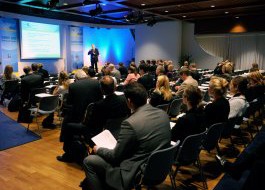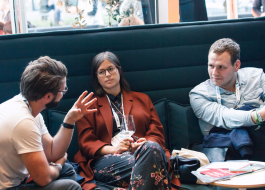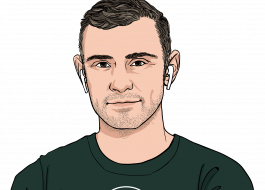
"Some ideas just can't wait," reads the website for the Thiel Fellowship.
In 2011, the investor, entrepreneur, and now Trump adviser Peter Thiel launched a program that awards $100,000 to promising young entrepreneurs who are willing to drop out of college and turn their bright ideas into real businesses. Dozens of tech prodigies have passed through the program, with mixed results. While plenty of Thiel fellows return to school after their two-year deployment in Silicon Valley, a few go on to create venture-backed startups worth millions.
We tracked down some of the most successful Thiel fellows to see what they're up to.
Ari Weinstein and Conrad Kramer's app was recognized by Apple for its brilliance.

The Thiel Fellowship brought together whiz kids Ari Weinstein, an MIT dropout, and Conrad Kramer, then a high school student, to work on two productivity apps. One took off.
Workflow stitches together tasks from multiple apps into one. Users can post an image to Facebook, get directions, order food, and do other things without leaving the app.
Workflow became the most purchased iPhone app for four days after it launched in 2014. In 2015, Apple awarded Weinstein and Kramer an award for the most innovative app of the year.
They continue to develop Workflow out of San Francisco. Their startup employs eight people.
Eden Full Goh has been named to the Forbes 30 Under 30 in Energy three years in a row.

At 19, Eden Full Goh left Princeton to turn her high school science project into a global nonprofit. That project, the SunSaluter, is a low-cost mechanism that allows solar panels to rotate and follow the sun throughout the day, boosting the panels' efficiency by 30%, it says.
The SunSaluter is in 18 countries, providing electricity to over 10,000 people.
Today, Goh serves as chair of the nonprofit and works at Thiel's software company, Palantir, where she spearheads the development of experimental client-facing products.
James Proud raised $40 million at a $250 million valuation for his startup, Hello.

Called "Peter Thiel's chosen one" by Forbes magazine, the 25-year-old CEO of Hello, a startup that makes a $149 sleep-tracking device for the bedroom, is one of the most successful Thiel fellows.
Proud passed on the chance to be the first in his family to go to college when he accepted a spot in the Thiel Fellowship. He joined to work on GigLocator, a website that aggregated concert-ticket information. It was later sold to a concert promoter in 2012 to the tune of six figures.
Hello's sleep tracker, called Sense, raised $2.4 million on Kickstarter in 2014, which is on par with what the Oculus Rift raised on the crowdfunding site. A source close to the company told Forbes that Hello expects to sell 250,000 units in 2017.
Proud is now raising more funding, including $2 million from Thiel himself.
Ritesh Agarwal created India's largest network of budget hotels.

Ritesh Agarwal called the Thiel Fellowship "the best thing that could have happened to me."
The 23-year-old millionaire, who grew up in a southern state of India, launched a global hospitality startup that aggregates budget hotels across India. Users can find rooms, book a reservation, and enjoy in-room amenities, such as branded linens, from Oyo Rooms.
The startup operates rooms in over 6,500 hotels in more than 200 cities. Agarwal, who serves as the company's CEO, has raised $187 million in funding at a $400 million valuation.
Laura Deming is on a mission to find the cure for aging.

Laura Deming has been unstoppable since 14, when she enrolled at MIT to work on artificial organogenesis, the making of tissues and organs. She dropped out after her sophomore year to further her research in anti-aging as a Thiel fellow.
Deming is one of few fellows who pursued interests outside the startup world. She works alongside former pharmaceutical executives and fund managers as a partner at the venture-capital firm The Longevity Fund. The firm aims to find and fund companies working to extend human life.
John Meyer's crowdsourced-journalism startup scored a deal with Fox TV.

Fox TV stations from New York to San Francisco cover the news with the help of Fresco News, an app that gathers photos and videos from everyday people who happen to be near a news event as it unfolds. The app has turned over 130,000 users into citizen journalists, it says.
When a media outlet uses a content found on the app, its creator gets a payout along the lines of $20 for photos and $50 for videos, of which Fresco News takes a cut.
In 2015, Meyer — who turned down an internship at Apple and walked away from New York University to become a Thiel fellow at 19 — raised $1.2 million from executives at CNN and Yahoo.
Jeremy Cai built a hiring platform used by startups like GrubHub and Groupon.

Jeremy Cai left Babson College to work on a major pain point in the on-demand economy: hiring. When companies like Deliveroo, a British food-delivery service, see demand go up, they need to grow quickly. OnboardIQ eases the process by automating parts of it, such as organizing applications, scheduling interviews, and facilitating background checks.
OnboardIQ has screened more than 3 million applicants in 40 countries, it says. Its clients, past and present, have included Shyp, GrubHub, Groupon, Munchery, Cabify, and Eaze.
Dylan Field is taking on Adobe with an innovative, collaborative design tool.

While it's not the Adobe-killer yet, Figma attracted attention in 2016 when it launched a software interface design tool that allows designers to work together on projects, side-by-side. The web-based app shows the changes a designer makes in real time, makes it easy to leave feedback, and saves versions of the project to the cloud, like Google Docs.
Figma has raised nearly $18 million in funding from Greylock Partners, LinkedIn CEO Jeff Weiner, and former White House US Chief Data Scientist D.J. Patil. Field is Figma's CEO.




